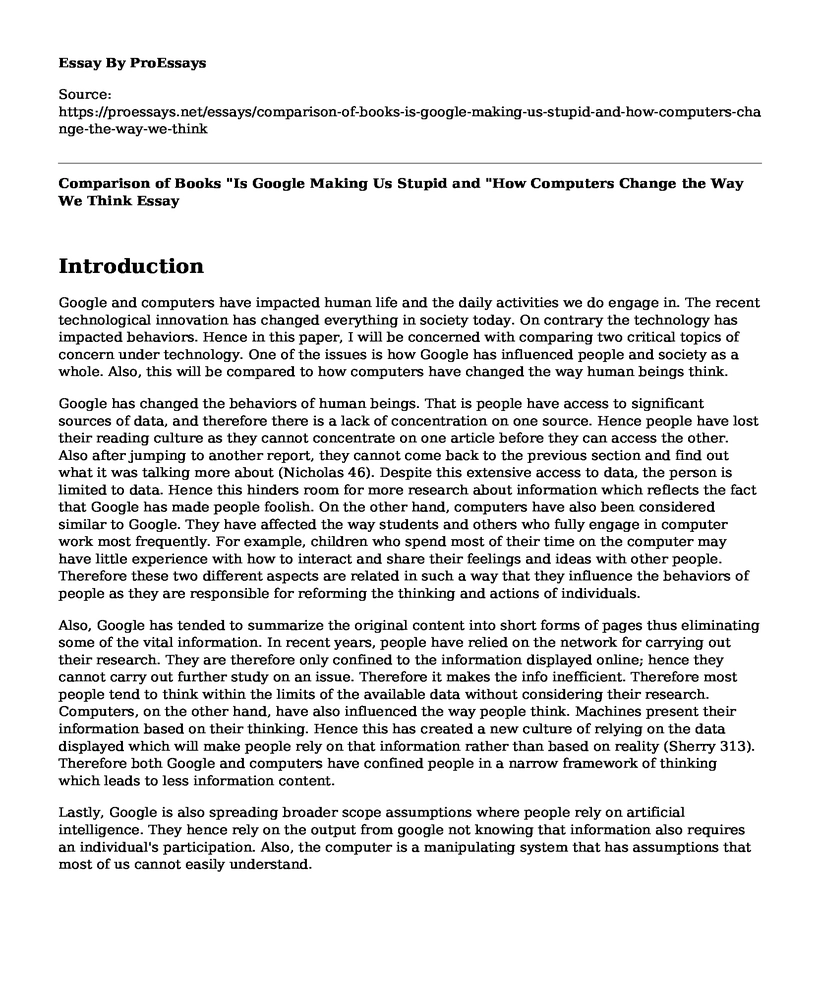Introduction
Google and computers have impacted human life and the daily activities we do engage in. The recent technological innovation has changed everything in society today. On contrary the technology has impacted behaviors. Hence in this paper, I will be concerned with comparing two critical topics of concern under technology. One of the issues is how Google has influenced people and society as a whole. Also, this will be compared to how computers have changed the way human beings think.
Google has changed the behaviors of human beings. That is people have access to significant sources of data, and therefore there is a lack of concentration on one source. Hence people have lost their reading culture as they cannot concentrate on one article before they can access the other. Also after jumping to another report, they cannot come back to the previous section and find out what it was talking more about (Nicholas 46). Despite this extensive access to data, the person is limited to data. Hence this hinders room for more research about information which reflects the fact that Google has made people foolish. On the other hand, computers have also been considered similar to Google. They have affected the way students and others who fully engage in computer work most frequently. For example, children who spend most of their time on the computer may have little experience with how to interact and share their feelings and ideas with other people. Therefore these two different aspects are related in such a way that they influence the behaviors of people as they are responsible for reforming the thinking and actions of individuals.
Also, Google has tended to summarize the original content into short forms of pages thus eliminating some of the vital information. In recent years, people have relied on the network for carrying out their research. They are therefore only confined to the information displayed online; hence they cannot carry out further study on an issue. Therefore it makes the info inefficient. Therefore most people tend to think within the limits of the available data without considering their research. Computers, on the other hand, have also influenced the way people think. Machines present their information based on their thinking. Hence this has created a new culture of relying on the data displayed which will make people rely on that information rather than based on reality (Sherry 313). Therefore both Google and computers have confined people in a narrow framework of thinking which leads to less information content.
Lastly, Google is also spreading broader scope assumptions where people rely on artificial intelligence. They hence rely on the output from google not knowing that information also requires an individual's participation. Also, the computer is a manipulating system that has assumptions that most of us cannot easily understand.
Conclusion
In conclusion, Google and computer have generally changed our thinking. Continued use of these technologies need to be fully supported by facts and also the individuals to do their research. Information that is available online of it is manipulated which provides a narrow scope of understanding. Therefore, before using google and computers in areas of research, we must present a full knowledge of the situation to identify any omitted and manipulated information.
Works Cited
Carr, Nicholas. "Is Google making us stupid?." Yearbook of the National Society for the Study of Education 107.2 (2008): 39-48.
Turkle, Sherry. "How computers change the way we think." Law and Society Approach to Cyberspace. Routledge, 2017. 309-315
Cite this page
Comparison of Books "Is Google Making Us Stupid and "How Computers Change the Way We Think. (2022, Mar 07). Retrieved from https://proessays.net/essays/comparison-of-books-is-google-making-us-stupid-and-how-computers-change-the-way-we-think
If you are the original author of this essay and no longer wish to have it published on the ProEssays website, please click below to request its removal:
- The Yellow Wallpaper Literary Analysis Essay
- August Wilson's Play "Fences" Essay
- How to Install Windows XP Paper Example
- Essay Sample on Information Security Analysts Work
- Literary Analysis Essay on "Love in the Time of Cholera" by Marquez
- Research Paper on Internet Development in SE Asia: Comparing Singapore & Malaysia
- Essay Sample on Power of the Internet: Improving Business Operations and Strategies







